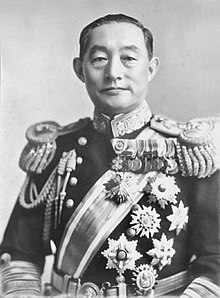Yonai Mitsumasa
Yonai Mitsumasa ( Japanese 米 内 光 政 ; born March 2, 1880 in Morioka , † April 20, 1948 in Tokyo ) was a Japanese admiral and politician. He was the 37th Prime Minister of Japan and served from January 16 to July 22, 1940.
Life
Yonai graduated from the Naval Academy in 1901 and was assigned to the crew of the Kongo tank corvette in the same year . In the following year he came on the armored cruiser Tokiwa and was promoted to lieutenant in 1903 . On board a destroyer and the armored cruiser Iwate , he took part in the Russo-Japanese War . It was used on the ships Niitaka , Shikishima , Satsuma and Tone until 1911 . In 1912 he graduated from Naval College .
During the First World War he served as a naval attaché in the Russian Empire from February 1915 to February 1917 . After the war, other foreign assignments followed in Europe, including in Poland , and in 1920 he was promoted to captain at sea . From 1922 Yonai was successively in command of the ships Kasuga , Iwate , Fusō and Mutsu before he was appointed Chief of Staff of the 2nd Fleet and promoted to Rear Admiral in 1925 . The following year he became chief of the 3rd office of the Admiralty's staff.
In 1928 Yonai became commander of the 1st expeditionary fleet in China and two years later commander of the Chinkai military district ( Chinkai Keibifu ) and promoted to vice admiral. In December 1932 he was appointed Commander in Chief of the 3rd Fleet and in November 1933 as Commander in Chief in the Sasebo Marine District. From November 1934 to December 1935 he commanded the 2nd Fleet and then the Yokosuka Navy District until December 1936. He was then appointed Commander in Chief of the Combined Fleet and at the same time the 1st Fleet, which he stayed for three months.
From February 1937 to August 1939, Yonai served as Minister of the Navy in three successive governments and was promoted to full admiral in April 1937. He was alarmed by the deepening split with the co-victorious powers of the First World War, Great Britain and the USA , but nevertheless authorized the construction of the super battleships of the Yamato class . His attitude earned him repeated death threats and assassination attempts from the Japanese ultra-nationalist camp.
As the successor to Abe Nobuyuki , Yonai became Prime Minister of Japan in January 1940 and continued his pro-British and American course until the increasing pressure from the camp of the axis-friendly Imperial Japanese Army and their refusal to start a new one after the resignation of Army Minister Hata Shunroku Appointing ministers, forced to resign in July 1940. As a result, Japan signed the three-power pact with Germany and Italy .
In July 1944, Yonai returned from the reserve in order to succeed Nomura Naokunis again as Minister of the Navy. After the surrender, and the occupation of Japan , he joined in November 1945 from his post and died in 1948 at the age of 68 years at a pneumonia .
literature
- Takagi Sōkichi: Yamamoto Isoroku to Yonai Mitsumasa: fu rengō kantai shimatsuki ( 山本五十六 と 米 内 光 政 - 付 ・ 連 合 艦隊 始末 記 ). Kōjinsha, Tokyo 1982, ISBN 4-7698-0173-4 .
Web links
- Hiroshi Nishida: Career Data for Yonai Mitsumasa
- Newspaper article about Yonai Mitsumasa in the 20th century press kit of the ZBW - Leibniz Information Center for Economics .
| personal data | |
|---|---|
| SURNAME | Yonai, Mitsumasa |
| ALTERNATIVE NAMES | 米 内 光 政 (Japanese) |
| BRIEF DESCRIPTION | Japanese admiral and politician, 37th Prime Minister of Japan |
| DATE OF BIRTH | March 2, 1880 |
| PLACE OF BIRTH | Morioka |
| DATE OF DEATH | April 20, 1948 |
| Place of death | Tokyo |
